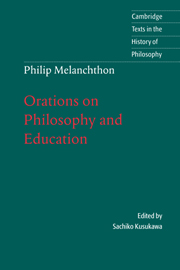Book contents
- Frontmatter
- Contents
- Acknowledgements
- Introduction
- Chronology
- Further reading
- Note on the text
- The scope of education
- 1 On the order of learning
- 2 On the rôle of the schools
- 3 On the distinction between the Gospel and philosophy
- The arts course
- The higher faculties
- Authorities
- Index
- Cambridge texts in the history of philosophy
3 - On the distinction between the Gospel and philosophy
Published online by Cambridge University Press: 05 June 2012
- Frontmatter
- Contents
- Acknowledgements
- Introduction
- Chronology
- Further reading
- Note on the text
- The scope of education
- 1 On the order of learning
- 2 On the rôle of the schools
- 3 On the distinction between the Gospel and philosophy
- The arts course
- The higher faculties
- Authorities
- Index
- Cambridge texts in the history of philosophy
Summary
When Paul says: ‘See to it that no one makes a prey of you by philosophy’ [Colossians 2:8], he does not reject philosophy but its abuse – just as, when someone says: ‘Take care not to be ensnared by wine’, he does not disparage wine but its abuse.
Paul is speaking of the kind of abuse that is most harmful in the Church, namely when Scripture is received as though it taught nothing other than a knowledge of human reason. For it is easy for cunning men to transform the Gospel, by skilful explanation, into philosophy, that is, the teaching of human reason. Thus Julian the Apostate charged the Christians with ignorance, because they had brought forth absurd beliefs, having misunderstood the figures of speech of Scripture.
Philosophy contains the art of rhetoric, physiology and precepts on civic morals. This teaching is a good creation of God, and the principal among all natural gifts. And it is a thing that is necessary in this corporal and civic life, such as food, drink, or such as public laws, etc.
Moral philosophy is the very law of God on civic morals.
The most absurd men of all are those who imagine that philosophy and the Gospel differ in such a way that either teaching is a law on morals, but that the Gospel adds a few laws on external works, such as that one must not take revenge, and other similar ones.
- Type
- Chapter
- Information
- Melanchthon: Orations on Philosophy and Education , pp. 23 - 26Publisher: Cambridge University PressPrint publication year: 1999



